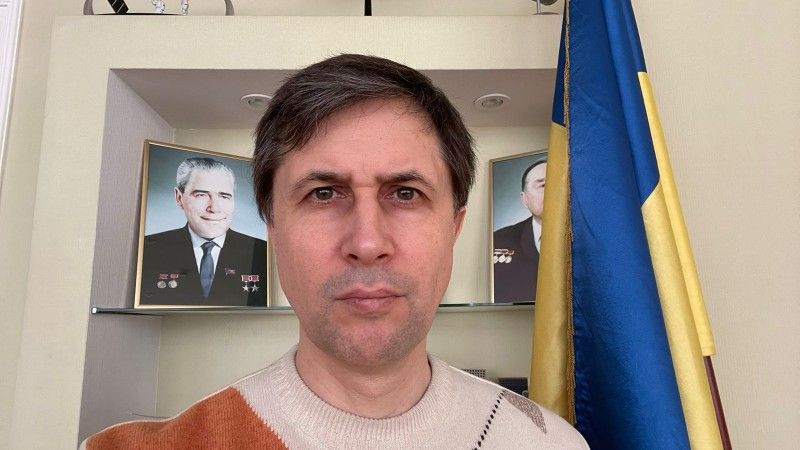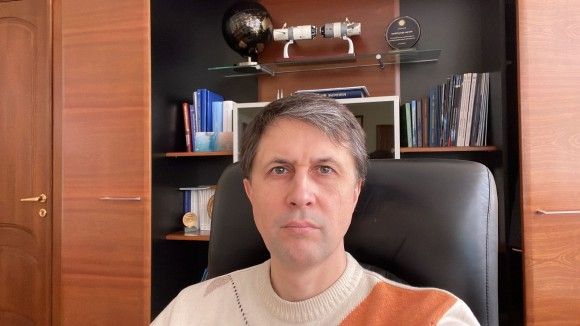Geopolitics
President of the State Space Agency of Ukraine: "Poland provides us with outstanding support during the war with Russia" [INTERVIEW]

We continue to discuss possible joint space projects. Being neighbours our countries have a lot of common interests and issues to be resolved. Space technologies are among the most important areas of cooperation between our countries – explains Vladimir Taftai, president of the State Space Agency of Ukraine (SSAU).
Paweł Ziemnicki: Where you surprised when the Russian forces started the attack on 24th February?
It was shock. Although the Russian Federation started its aggression against Ukraine in 2014 I did not believe that that full-scale aggression can take place.
In the spring and later in the autumn of last year, when mass movements of Russian troops to the Ukrainian border began, it became clear that the probability of aggravation of the situation is very high. However, like any normal person of the twenty-first century, I did not expect the attack to be so brutal. That it will be aimed at the complete destruction of infrastructure of Ukraine, settlements and the destruction of its population and the Ukrainian nation as a whole.
Do Ukrainian space assets and related industry support army during an ongoing conflict?
In wartime, all the efforts of the state and its citizens are aimed at achieving victory. Of course, the State Space Agency cannot stand aside. In this situation we are doing everything within our capabilities to bring closer today's common goal of all Ukrainian citizens.
Are the space companies still working on their projects? How is their staff supporting war efforts?
Russia's attack once again hit all types of economic activity in Ukraine, including the work of space enterprises, very painfully. As I already mentioned, our state and the Ukrainian space industry in 2014 already experienced the shock of Russian aggression, not only in military, but also in economic and social dimensions. But today we have an unprecedented situation for all the years of independence. We understand that we cannot feel safe before Russian missile strikes anywhere in Ukraine. Therefore, in the process of working on space projects, the preservation of human potential is a priority. At the same time, our foreign partners understand the situation that has changed in Ukraine, and at present, all previously reached agreements on cooperation remain in effect.
What kind of support did you get from international space industry?
Of course, we maintain contacts with a number of international partners and receive support from them. Among other things, political support is very important for us. It confirms that European community considers Ukrainian people as part of itself. After all, by heroically counteracting Russian aggression, we are not only defending our territory and our right to exist, but we are also fighting for the pan-European values of freedom and democracy. In this regard, we have intensified the process towards Ukraine's membership in the European Space Agency. It is extremely important for our common victory.
What was the condition and stage of development of the Ukrainian space industry when the war began?
As I mentioned, since 2014 it was not easy time for Ukrainian Space sector. In recent years, the Ukrainian space industry has experienced insufficient funding and therefore did not have enough resources for full development. At the same time, we have saved our capabilities and largely introduced new technologies in the design and construction of launch vehicles, including continuing to participate in the Antares and Vega projects, developed satellite production, significantly expanded ground space infrastructure, and developed our capabilities in receiving and processing of Earth observation data. We expected the adoption by the Ukrainian Parliament of the Space Program of Ukraine for the next five years. This would have provided public funding for major space projects.
However, the war prevented this and it is now difficult to predict when this might happen. It is obvious that after the war, the Ukrainian budget will face a colossal burden, because significant funds will be required to restore the state, since the damage is enormous.
So, we really need the support of our foreign partners for this.
What were the major achievements and most important future goals?
As for the important goals, they are set out in the Space Program of Ukraine, which I have already mentioned. Among them are the development of rocket technologies, including the creation of the Cyclone-4M space rocket system with the Canadian company Maritime Launch to carry out space launches from Canada, and the creation of the Ukrainian spacecraft constellation for Earth observation. Of course, a very important task for us is the development of international cooperation, including participation in major international space exploration programs, primarily Artemis. Among the strategic tasks is the integration of Ukraine with the European Space Agency.
How are you leveraging the old Soviet legacy as far as technologies and factories are concerned?
It's no secret that the legacy of the Soviet Union forms the backbone of Ukraine's space industry. On the one hand, this is an advantage, and on the other hand, it requires huge investments. The entire inherited industrial complex was aimed only at cooperation with the Russian Federation. Ukrainian enterprises in Soviet times carried out huge part of rocket production, including military ones. Therefore, especially after 2014, our main task is to refocus on Western partnership, introducing new models in enterprise management, use technologies effectively, focus on those projects that will bring maximum practical benefit and provide the development of space technologies.
How do you envision your national space program for the closest future after the war?
I do not think that our main goals will change much after the war. But I think that we will need to reconsider them. Because I hope that, including the support of the Polish side, we will be able to get closer to the European Space Agency. Therefore, this factor must be taken into account.
Of course, it will be necessary to update the approaches to involving the space industry of Ukraine in ensuring national security. Because, even after our common victory, the potential danger from Russia will not disappear, so national security measures will be our priority.
What would be the role of smaller private companies and their relations with older state-owned entrepreneurships?
The SSAU understands the importance of private companies for the dynamic development of space activities. Therefore, in 2020, a number of bans on the implementation of space activities, that previously were applied to the private sector in Ukraine, has been lifted. We are trying to maintain links between state and private enterprises. I am sure that after the adoption of the Space Program, private enterprises will be able to participate in tenders for the implementation of this program at equal level with state ones.
Can you describe the way to achieve goals like building autonomous capabilities in the area of military and civil Earth observation?
At present, we have considerable experience and effective methods for processing Earth observation data, including for defence purposes. Of course, an important task for the establishment of independent capabilities in this area is the creation of our own high-resolution spacecraft constellation. However, the creation of such an efficient system requires significant financial investments.

Does Ukraine have the necessary assets to deal with Space Situational Awareness and Space Surveillance and Tracking? Where the SSA and SST national capabilities affected by Russian invasion on Crimea?
In 2014 we lost in the Crimea significant part of our capabilities in the field of SSA, including a radio telescope with a diameter of 70 meters. However, in recent years we have managed to create a system of facilities in different parts of Ukraine capable of performing important tasks of monitoring and controlling the space situation. We have experienced staff, so we are ready to cooperate with foreign partners in this area.
How about ensuring independent access to space via horizontal air-launch capabilities? How may Poland work with you in this area?
Yes, the creation of a space launch complex using air launch technology is one of the projects on which we are exploring the possibility of cooperation with POLSA. The implementation of such a project will provide our courtiers with access to space launches, despite the lack of technical capability to carry out traditional ground launches from the territory of Ukraine and Poland.
I also have to note that Poland and POLSA in particular provides us with outstanding support during the war with Russia. We appreciate our Polish colleagues and friends for that support at the institutional level and in the area of humanitarian support.
How does POLSA support The State Space Agency of Ukraine (SSAU) and what are the areas of cooperation between both institutions during the ongoing war?
I am pleased to note that the Polish Space Agency is supporting us very actively in the difficult time of the war. We work in a number of areas. One them we already mentioned is air-launch capacities. POLSA also provides us support in organization of joint expositions at international exhibitions, such as joint POLSA-SSAU stand at recent FIDAE exposition in Chile. This support for Ukraine within the framework of international organizations is very important. We continue to discuss possible joint space projects. Being neighbours our countries have a lot of common interests and issues to be resolved. Space technologies are among the most important areas of cooperation between our countries.
POLSA also assists in the collection and delivery of humanitarian aid to residents of Ukrainian cities affected by Russian bombing and shelling. This support is also extremely important for us these days.
What technologies or common projects may be launched, developed or implemented between both of our space agencies these days?
Thera are many areas of potential cooperation. We are in active dialogue between the SSAU and the POLSA to determine certain projects to be implemented. Among the main areas there will certainly be areas such as rocket technologies and Earth observation.
What would you wish for yourself and your brave country? What are your plans for the time when the conflict is over?
Of course, I want to wish myself, and you, and all of us a quick victory! I am confident that extraordinary international consolidation of efforts to help Ukraine in its opposition to the aggressor, which we have been observing for many weeks, will bring results and together we will win in the near future.
As for plans after the war, of course, the Ukrainian people will have a lot of work to do in order to restore our destroyed country. I am sure that space technologies will help us in this.
I hope for a new level of international cooperation, because this terrible war not only defined the enemies of Ukraine, but also clearly identified its true friends. Among such friends of Ukraine, of course, is Poland, and for the State Space Agency of Ukraine it is the Polish Space Agency.
